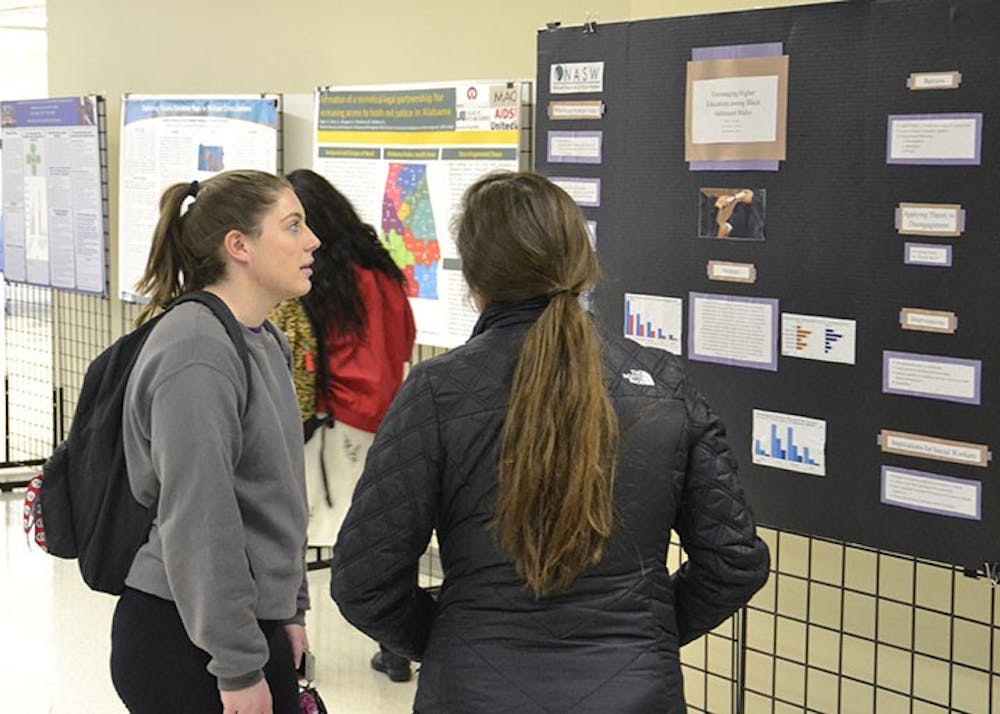Researchers from across the country converged at Shippensburg University Friday for the second annual social justice conference, which seeks to discuss and unveil social problems.
The Institute for Social Inclusion’s (INSINC) conference assembled multi-disciplinary professionals and SU students for a day of panels and workshops where attendees discussed issues of social equity and shared best practices for promoting social inclusion of minority groups.
The conference, which occurred in SU’s Ceddia Union Building, attracted speakers as far away as Texas and Alabama, including Brian Grossman, an assistant professor from the University of Illinois at Chicago who gave the day’s keynote address over lunch.
If you don’t have a seat at the table, then you are on the menu, Grossman said, quoting human rights activist Wade Henderson. “And I’m not just saying that because it’s lunch.”
Grossman’s presentation discussed everything from the history of disability rights in the United States to obstacles people with disabilities face when moving from state-to-state. He talked about the importance of accessibility and inclusiveness, challenging society’s standard definition of citizenship.
“Citizenship means that people have equal access to the rights of all other citizens, and rights are not curtailed,” Grossman said.
These themes pervaded the panels and guest lectures throughout the day, such as director of the Franklin County Day Reporting Center, Kimberly Eaton’s “Marginalized Populations within the Criminal Justice System” or Stephen Stoeffler’s “Using Targeted Universalism to Increase Service Access for Marginalized Populations.” In the latter, Stoeffler, an assistant social work professor at Kutztown University, talked about a new approach to creating inclusive policy.
Stoeffler presented attendees with a situation — there’s a cache of free money in SU’s bookstore, and anyone can take it, but some people might be off campus, or be at work, or have shorter legs.
By default, some people have an advantage. This is how institutions typically handle policy, according to Stoeffler, making policies that mean to benefit all but ultimately ostracizing certain groups. Instead, the targeted universalism approach aims for the same goal of helping as many people as possible, but acknowledges and caters to the varied circumstances of its body.
“It’s not just the people who need to be educated, but the institutions as well,” Stoeffler said.
The INSINC conference was designed to give professors, such as Stoeffler, the opportunity to share their research with students, other professionals and the community, according to INSINC founder Marita Flagler.
“We’re trying to develop a platform where people of different disciplines can come together to talk about issues that affect us all,” Flagler said.
In addition to creating discussion with attendees from a diverse field of professions, Flagler also sees the day as an excellent out-of-the-classroom learning experience for students.
“This is not what faculty usually talk about,” Flagler said. “They’re sharing findings from their research, and students will see different sides of their professors other than the grading-papers-and-exams side.”
SU senior Ashley Nowak, who is studying Spanish and secondary education, witnessed this firsthand.
“My role today is to just take it all in,” Nowak said. “To take it all in and see how I can address these needs in my own classrooms someday. Right now, I’m just learning.”





The Slate welcomes thoughtful discussion on all of our stories, but please keep comments civil and on-topic. Read our full guidelines here.